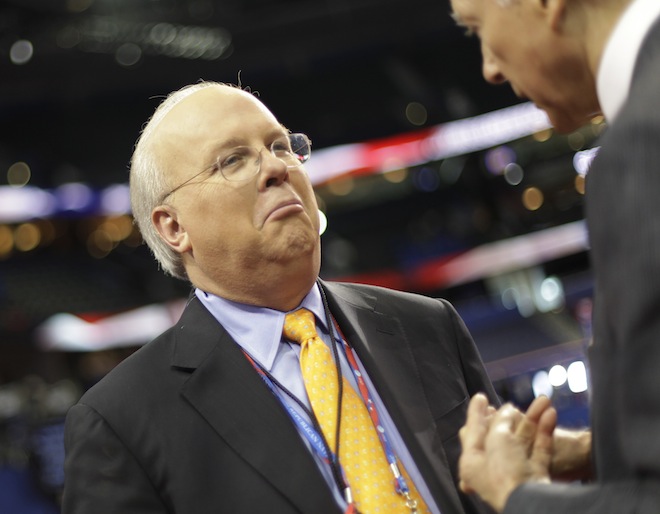A battle between Karl Rove and the far right is the latest front in a growing civil war for the heart and soul of the Republican Party and clarifies the contours of the struggle.
On one side are the establishment Republicans, who recognize the changing face of the American electorate and want their party to win elections in the future. In this battle, they are represented by Rove and his new Conservative Victory Project, unveiled this week, which is targeting unelectable (read: extremely conservative) candidates in Republican Senate primaries.
“There is a broad concern about having blown a significant number of races because the wrong candidates were selected,” Steven Law, who will run Rove’s new effort, told the New York Times. “We don’t view ourselves as being in the incumbent protection business, but we want to pick the most conservative candidate who can win.” Law is also president of the Rove-backed American Crossroads and CrossroadsGPS.
On the other side are the ultraconservatives, who believe the road to success involves full-fledged, uncompromising dedication to their tea party principles. These are right-wing groups like FreedomWorks and GOP Senate hopefuls like Reps. Paul Broun (GA) and Steve King (IA), who are the types of far-right candidates Rove is expected to target.
“The Conservative Victory Project represents the latest round in a fight that’s been going on for decades,” said Jack Pitney, a political science professor at Claremont McKenna College. “Since the origins of the modern conservative movement in the mid-1950s, purists and pragmatists have been battling for dominance in the GOP.”
The latest round began when Rove sent donors a fundraising plea aimed at opposing Senate primary candidates deemed unelectable. Rove-backed American Crossroads spent $300 million trying to help Republican candidates win elections in 2012 and came up empty, arguably sunk by “legitimate rape” and other utterances by conservative Senate nominees that damaged Republican candidates across the board.
The pushback against Rove’s new PAC was fierce and swift from the right-wing apparatus.
“The Empire is striking back,” warned Matt Kibbe, the president of FreedomWorks.
Tea party-backed former Rep. Joe Walsh (R-IL) told TPM he’ll start a super PAC to counter Rove’s effort, declaring, “If Rove wants a fight for the soul of the Republican Party, bring it on.”
In the Georgia Senate race, Congressman Broun vowed not to be “intimidated” by the establishment. In Iowa, Congressman King declared that “[n]obody can bully me out of running for the U.S. Senate, not even Karl Rove and his hefty war chest.”
RedState’s Erick Erickson wrote: “I dare say any candidate who gets this group’s support should be targeted for destruction by the conservative movement.”
Brent Bozell of the conservative Media Research Center slammed Rove’s group, calling it “shamelessly” named, arguing that right-wing candidates like Ted Cruz (TX), Marco Rubio (FL), and Pat Toomey (PA) have won Senate seats. In response, Rove’s spokesman Jonathan Collegio called Bozell a “hater.”
That prompted a letter from a swath of tea party activists, social conservative leaders and right-wing talk radio hosts to demand that Collegio be fired. In the letter, these conservatives staked their claim to being the true Republican establishment, calling Bozell a “legacy” and citing his unimpeachable bloodlines:
He has devoted his life to the cause of American conservatism as did his father, Brent Bozell II, who wrote ‘Conscience of a Conservative’ for Barry Goldwater. Maybe you’ve heard of Brent’s uncle, Bill Buckley, whose words you misquote and twist as the basis for your organization enough to falsely suggest you know something about him. You may have heard of his other uncle, Jim Buckley, a former U.S. Senator, or Brent’s mother, Patricia Buckley Bozell–both important figures and writers in our conservative movement.
On Tuesday night, Rove defended his project against some of the criticism. “This is not tea party versus establishment,” he said on Fox News. “I don’t want a fight.”
Other conservatives have reacted with concern about Rove’s new project.
Longtime Republican operative Roger Stone told TPM that the Conservative Victory Project will divide the GOP and alienate conservatives. He dubbed it a “suicide PAC.” CNS News editor-in-chief Terence Jeffrey questioned Rove’s conservative credentials. Club For Growth’s Chris Chocola criticized his logic to the New York Times, saying that it’s “those pesky voters … [who] get to decide who the nominee is.” Donald Trump called Rove “a total loser.”
The escalating battle comes amid a dramatic post-election shift among congressional Republicans away from ultraconservative orthodoxy. House GOP leaders have sidelined some of their most far-right members from key committees and are moving away from using the threat of crisis as a bargaining chip to achieve their ideological goals. They’re even entertaining the prospect of stricter background checks for gun purchases and supporting normalizing the status of illegal immigrants — both unthinkable just months ago.
Pitney said Republicans tend to agree in principle on nominating the most conservative candidate who can win, but purists believe that those who favor more moderate GOP candidates “underestimate the electability of strong conservatives.”
“The GOP’s current problem is that some conservative activists support the most conservative candidate even when that candidate is badly flawed,” he said, “as with Sharron Angle in 2010 and Todd Akin in 2012.”










